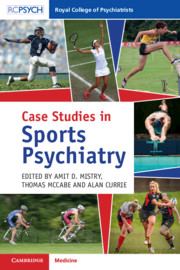Book contents
- Case Studies in Sports Psychiatry
- Reviews
- Case Studies in Sports Psychiatry
- Copyright page
- Contents
- Editors
- Contributors
- Foreword
- Preface
- Chapter 1 American Football: Cognitive Impairment
- Chapter 2 Athletics: Energy Levels, Exercise Addiction and Disordered Eating
- Chapter 3 Boxing: Low Mood and Gambling
- Chapter 4 Cricket: Mental Health Emergencies
- Chapter 5 Cycling: Attention Deficit Hyperactivity Disorder and Anti-Doping
- Chapter 6 Football: Alcohol and Barriers to Support
- Chapter 7 Golf: Alcohol, Anxiety and Sleep Problems
- Chapter 8 Rugby: Concussion and Mental Health Symptoms
- Chapter 9 Swimming: Adolescent Athlete Training Commitments
- Chapter 10 Tennis: Trauma and Tours
- Appendix: International Society for Sports Psychiatry Curriculum 2018
- Index
- Plate Section
- References
Chapter 8 - Rugby: Concussion and Mental Health Symptoms
Published online by Cambridge University Press: 29 July 2020
- Case Studies in Sports Psychiatry
- Reviews
- Case Studies in Sports Psychiatry
- Copyright page
- Contents
- Editors
- Contributors
- Foreword
- Preface
- Chapter 1 American Football: Cognitive Impairment
- Chapter 2 Athletics: Energy Levels, Exercise Addiction and Disordered Eating
- Chapter 3 Boxing: Low Mood and Gambling
- Chapter 4 Cricket: Mental Health Emergencies
- Chapter 5 Cycling: Attention Deficit Hyperactivity Disorder and Anti-Doping
- Chapter 6 Football: Alcohol and Barriers to Support
- Chapter 7 Golf: Alcohol, Anxiety and Sleep Problems
- Chapter 8 Rugby: Concussion and Mental Health Symptoms
- Chapter 9 Swimming: Adolescent Athlete Training Commitments
- Chapter 10 Tennis: Trauma and Tours
- Appendix: International Society for Sports Psychiatry Curriculum 2018
- Index
- Plate Section
- References
Summary
BD is a 34-year-old semi-professional rugby union player and a part-time schoolteacher. Three years ago she suffered three concussions during one season and required a prolonged period of rest. Following an extended RTP protocol, which involved a month away from any rugby contact and a gradual increase in physical activity, she was integrated back into the team environment although she always thought she never reached her previous level of performance.
- Type
- Chapter
- Information
- Case Studies in Sports Psychiatry , pp. 98 - 108Publisher: Cambridge University PressPrint publication year: 2020

